Analysis of External and Internal Business Environment: Unilever
VerifiedAdded on 2020/10/22
|14
|4146
|467
Report
AI Summary
This report offers a comprehensive analysis of Unilever's business environment, examining the impact of external and internal factors on its operations. The introduction provides an overview of the business environment and introduces Unilever, a multinational company operating in approximately 190 countries with a wide range of branded products. The report delves into the relationship between various functions within the company, including sales and marketing, finance, human resources, production, and research and development, highlighting their interdependencies. It further explores the positive and negative effects of external environmental factors, such as political, economic, social, technological, legal, and environmental influences (PESTEL analysis), on Unilever's performance. The report also assesses Unilever's strengths and weaknesses in relation to the macro-environmental factors. Overall, this report provides valuable insights into Unilever's strategic approach to navigate the complexities of the global business landscape.
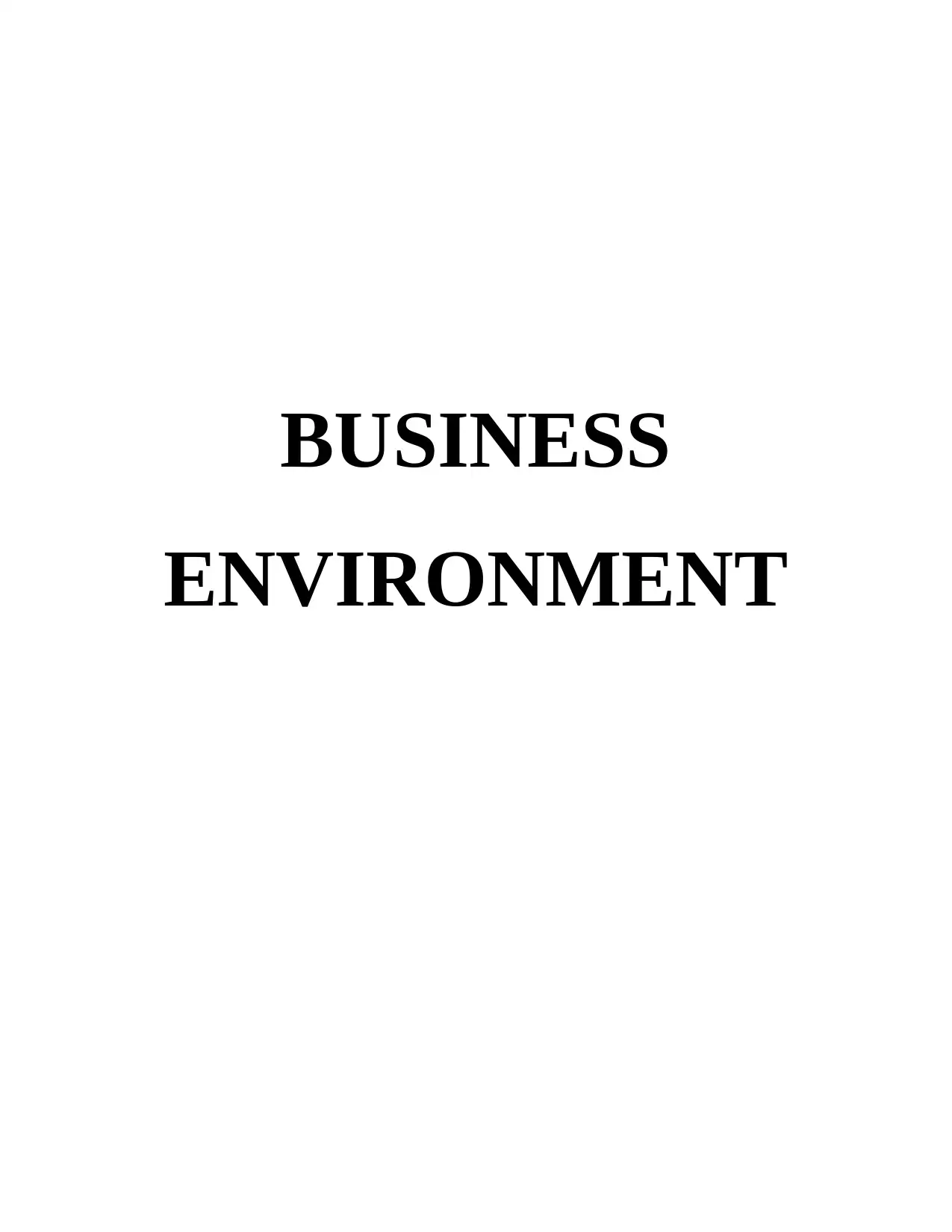
BUSINESS
ENVIRONMENT
ENVIRONMENT
Paraphrase This Document
Need a fresh take? Get an instant paraphrase of this document with our AI Paraphraser
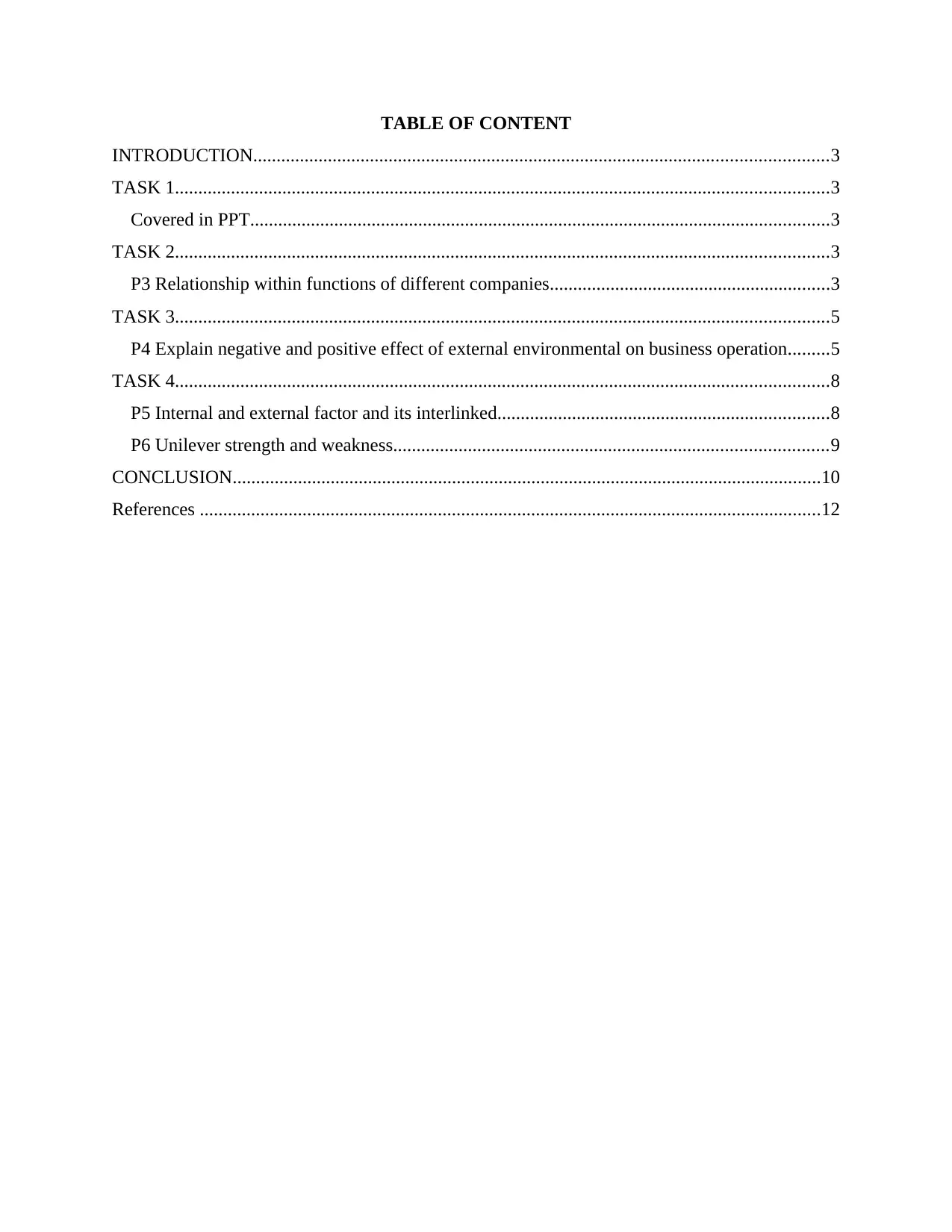
TABLE OF CONTENT
INTRODUCTION...........................................................................................................................3
TASK 1............................................................................................................................................3
Covered in PPT............................................................................................................................3
TASK 2............................................................................................................................................3
P3 Relationship within functions of different companies............................................................3
TASK 3............................................................................................................................................5
P4 Explain negative and positive effect of external environmental on business operation.........5
TASK 4............................................................................................................................................8
P5 Internal and external factor and its interlinked.......................................................................8
P6 Unilever strength and weakness.............................................................................................9
CONCLUSION..............................................................................................................................10
References .....................................................................................................................................12
INTRODUCTION...........................................................................................................................3
TASK 1............................................................................................................................................3
Covered in PPT............................................................................................................................3
TASK 2............................................................................................................................................3
P3 Relationship within functions of different companies............................................................3
TASK 3............................................................................................................................................5
P4 Explain negative and positive effect of external environmental on business operation.........5
TASK 4............................................................................................................................................8
P5 Internal and external factor and its interlinked.......................................................................8
P6 Unilever strength and weakness.............................................................................................9
CONCLUSION..............................................................................................................................10
References .....................................................................................................................................12
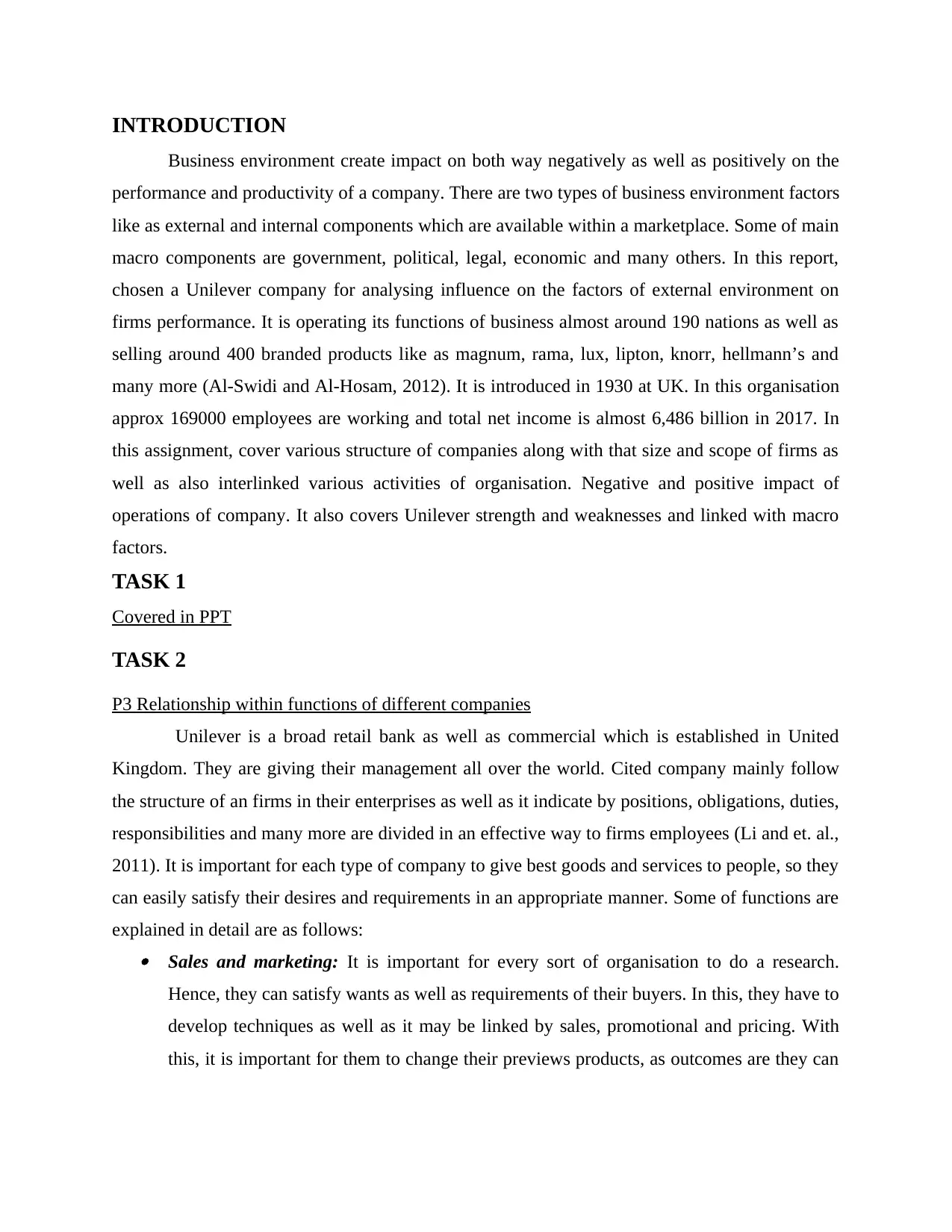
INTRODUCTION
Business environment create impact on both way negatively as well as positively on the
performance and productivity of a company. There are two types of business environment factors
like as external and internal components which are available within a marketplace. Some of main
macro components are government, political, legal, economic and many others. In this report,
chosen a Unilever company for analysing influence on the factors of external environment on
firms performance. It is operating its functions of business almost around 190 nations as well as
selling around 400 branded products like as magnum, rama, lux, lipton, knorr, hellmann’s and
many more (Al-Swidi and Al-Hosam, 2012). It is introduced in 1930 at UK. In this organisation
approx 169000 employees are working and total net income is almost 6,486 billion in 2017. In
this assignment, cover various structure of companies along with that size and scope of firms as
well as also interlinked various activities of organisation. Negative and positive impact of
operations of company. It also covers Unilever strength and weaknesses and linked with macro
factors.
TASK 1
Covered in PPT
TASK 2
P3 Relationship within functions of different companies
Unilever is a broad retail bank as well as commercial which is established in United
Kingdom. They are giving their management all over the world. Cited company mainly follow
the structure of an firms in their enterprises as well as it indicate by positions, obligations, duties,
responsibilities and many more are divided in an effective way to firms employees (Li and et. al.,
2011). It is important for each type of company to give best goods and services to people, so they
can easily satisfy their desires and requirements in an appropriate manner. Some of functions are
explained in detail are as follows: Sales and marketing: It is important for every sort of organisation to do a research.
Hence, they can satisfy wants as well as requirements of their buyers. In this, they have to
develop techniques as well as it may be linked by sales, promotional and pricing. With
this, it is important for them to change their previews products, as outcomes are they can
Business environment create impact on both way negatively as well as positively on the
performance and productivity of a company. There are two types of business environment factors
like as external and internal components which are available within a marketplace. Some of main
macro components are government, political, legal, economic and many others. In this report,
chosen a Unilever company for analysing influence on the factors of external environment on
firms performance. It is operating its functions of business almost around 190 nations as well as
selling around 400 branded products like as magnum, rama, lux, lipton, knorr, hellmann’s and
many more (Al-Swidi and Al-Hosam, 2012). It is introduced in 1930 at UK. In this organisation
approx 169000 employees are working and total net income is almost 6,486 billion in 2017. In
this assignment, cover various structure of companies along with that size and scope of firms as
well as also interlinked various activities of organisation. Negative and positive impact of
operations of company. It also covers Unilever strength and weaknesses and linked with macro
factors.
TASK 1
Covered in PPT
TASK 2
P3 Relationship within functions of different companies
Unilever is a broad retail bank as well as commercial which is established in United
Kingdom. They are giving their management all over the world. Cited company mainly follow
the structure of an firms in their enterprises as well as it indicate by positions, obligations, duties,
responsibilities and many more are divided in an effective way to firms employees (Li and et. al.,
2011). It is important for each type of company to give best goods and services to people, so they
can easily satisfy their desires and requirements in an appropriate manner. Some of functions are
explained in detail are as follows: Sales and marketing: It is important for every sort of organisation to do a research.
Hence, they can satisfy wants as well as requirements of their buyers. In this, they have to
develop techniques as well as it may be linked by sales, promotional and pricing. With
this, it is important for them to change their previews products, as outcomes are they can
⊘ This is a preview!⊘
Do you want full access?
Subscribe today to unlock all pages.

Trusted by 1+ million students worldwide
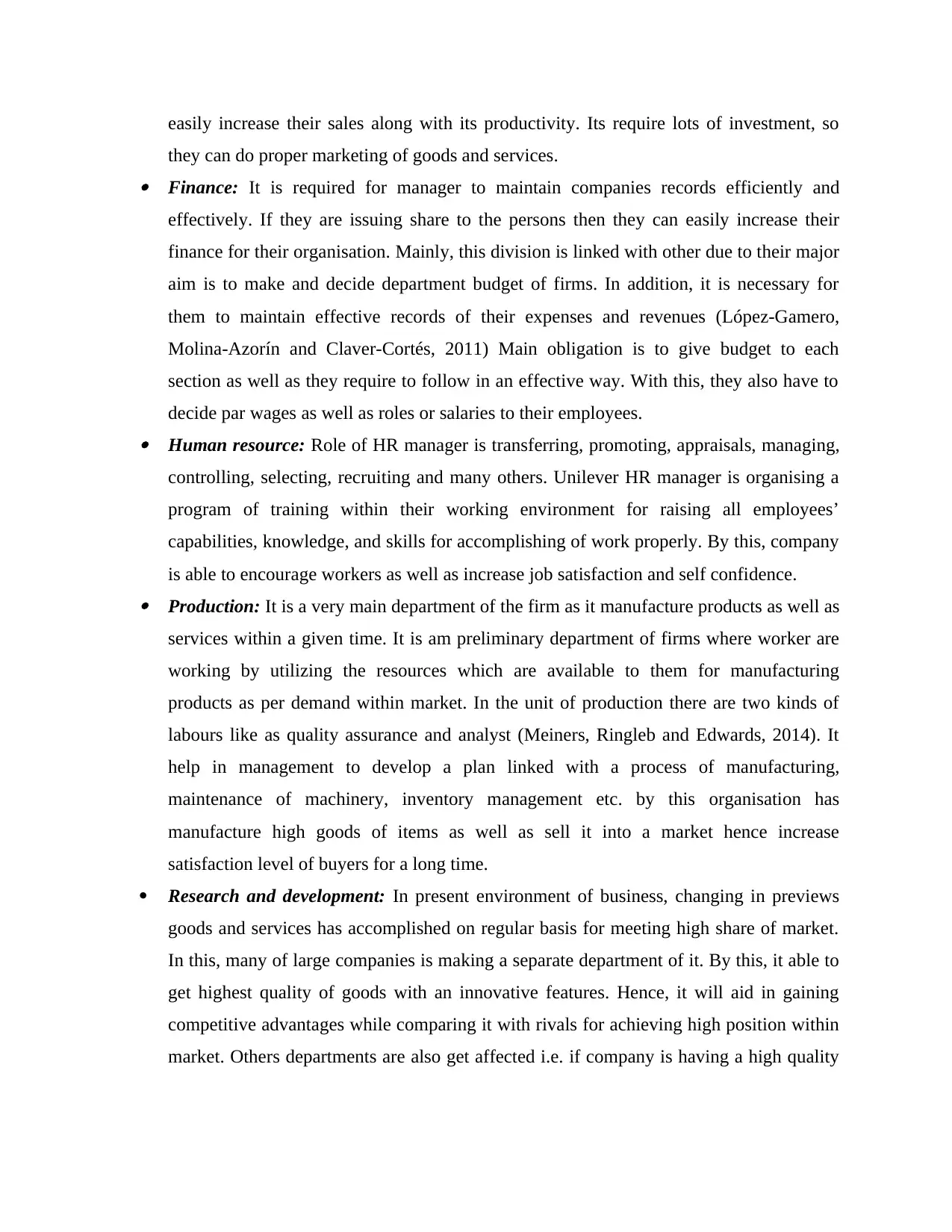
easily increase their sales along with its productivity. Its require lots of investment, so
they can do proper marketing of goods and services. Finance: It is required for manager to maintain companies records efficiently and
effectively. If they are issuing share to the persons then they can easily increase their
finance for their organisation. Mainly, this division is linked with other due to their major
aim is to make and decide department budget of firms. In addition, it is necessary for
them to maintain effective records of their expenses and revenues (López-Gamero,
Molina-Azorín and Claver-Cortés, 2011) Main obligation is to give budget to each
section as well as they require to follow in an effective way. With this, they also have to
decide par wages as well as roles or salaries to their employees. Human resource: Role of HR manager is transferring, promoting, appraisals, managing,
controlling, selecting, recruiting and many others. Unilever HR manager is organising a
program of training within their working environment for raising all employees’
capabilities, knowledge, and skills for accomplishing of work properly. By this, company
is able to encourage workers as well as increase job satisfaction and self confidence. Production: It is a very main department of the firm as it manufacture products as well as
services within a given time. It is am preliminary department of firms where worker are
working by utilizing the resources which are available to them for manufacturing
products as per demand within market. In the unit of production there are two kinds of
labours like as quality assurance and analyst (Meiners, Ringleb and Edwards, 2014). It
help in management to develop a plan linked with a process of manufacturing,
maintenance of machinery, inventory management etc. by this organisation has
manufacture high goods of items as well as sell it into a market hence increase
satisfaction level of buyers for a long time.
Research and development: In present environment of business, changing in previews
goods and services has accomplished on regular basis for meeting high share of market.
In this, many of large companies is making a separate department of it. By this, it able to
get highest quality of goods with an innovative features. Hence, it will aid in gaining
competitive advantages while comparing it with rivals for achieving high position within
market. Others departments are also get affected i.e. if company is having a high quality
they can do proper marketing of goods and services. Finance: It is required for manager to maintain companies records efficiently and
effectively. If they are issuing share to the persons then they can easily increase their
finance for their organisation. Mainly, this division is linked with other due to their major
aim is to make and decide department budget of firms. In addition, it is necessary for
them to maintain effective records of their expenses and revenues (López-Gamero,
Molina-Azorín and Claver-Cortés, 2011) Main obligation is to give budget to each
section as well as they require to follow in an effective way. With this, they also have to
decide par wages as well as roles or salaries to their employees. Human resource: Role of HR manager is transferring, promoting, appraisals, managing,
controlling, selecting, recruiting and many others. Unilever HR manager is organising a
program of training within their working environment for raising all employees’
capabilities, knowledge, and skills for accomplishing of work properly. By this, company
is able to encourage workers as well as increase job satisfaction and self confidence. Production: It is a very main department of the firm as it manufacture products as well as
services within a given time. It is am preliminary department of firms where worker are
working by utilizing the resources which are available to them for manufacturing
products as per demand within market. In the unit of production there are two kinds of
labours like as quality assurance and analyst (Meiners, Ringleb and Edwards, 2014). It
help in management to develop a plan linked with a process of manufacturing,
maintenance of machinery, inventory management etc. by this organisation has
manufacture high goods of items as well as sell it into a market hence increase
satisfaction level of buyers for a long time.
Research and development: In present environment of business, changing in previews
goods and services has accomplished on regular basis for meeting high share of market.
In this, many of large companies is making a separate department of it. By this, it able to
get highest quality of goods with an innovative features. Hence, it will aid in gaining
competitive advantages while comparing it with rivals for achieving high position within
market. Others departments are also get affected i.e. if company is having a high quality
Paraphrase This Document
Need a fresh take? Get an instant paraphrase of this document with our AI Paraphraser
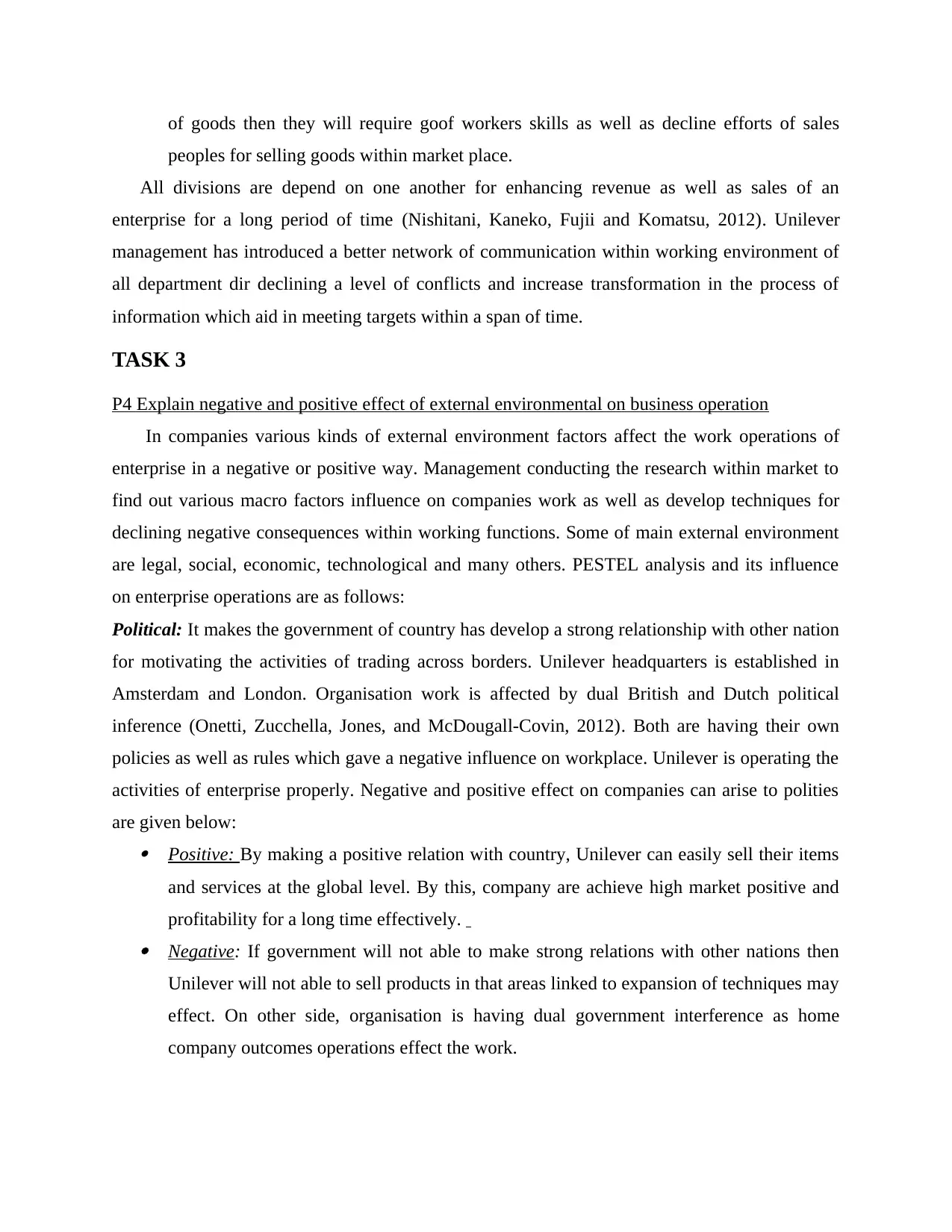
of goods then they will require goof workers skills as well as decline efforts of sales
peoples for selling goods within market place.
All divisions are depend on one another for enhancing revenue as well as sales of an
enterprise for a long period of time (Nishitani, Kaneko, Fujii and Komatsu, 2012). Unilever
management has introduced a better network of communication within working environment of
all department dir declining a level of conflicts and increase transformation in the process of
information which aid in meeting targets within a span of time.
TASK 3
P4 Explain negative and positive effect of external environmental on business operation
In companies various kinds of external environment factors affect the work operations of
enterprise in a negative or positive way. Management conducting the research within market to
find out various macro factors influence on companies work as well as develop techniques for
declining negative consequences within working functions. Some of main external environment
are legal, social, economic, technological and many others. PESTEL analysis and its influence
on enterprise operations are as follows:
Political: It makes the government of country has develop a strong relationship with other nation
for motivating the activities of trading across borders. Unilever headquarters is established in
Amsterdam and London. Organisation work is affected by dual British and Dutch political
inference (Onetti, Zucchella, Jones, and McDougall-Covin, 2012). Both are having their own
policies as well as rules which gave a negative influence on workplace. Unilever is operating the
activities of enterprise properly. Negative and positive effect on companies can arise to polities
are given below: Positive: By making a positive relation with country, Unilever can easily sell their items
and services at the global level. By this, company are achieve high market positive and
profitability for a long time effectively. Negative: If government will not able to make strong relations with other nations then
Unilever will not able to sell products in that areas linked to expansion of techniques may
effect. On other side, organisation is having dual government interference as home
company outcomes operations effect the work.
peoples for selling goods within market place.
All divisions are depend on one another for enhancing revenue as well as sales of an
enterprise for a long period of time (Nishitani, Kaneko, Fujii and Komatsu, 2012). Unilever
management has introduced a better network of communication within working environment of
all department dir declining a level of conflicts and increase transformation in the process of
information which aid in meeting targets within a span of time.
TASK 3
P4 Explain negative and positive effect of external environmental on business operation
In companies various kinds of external environment factors affect the work operations of
enterprise in a negative or positive way. Management conducting the research within market to
find out various macro factors influence on companies work as well as develop techniques for
declining negative consequences within working functions. Some of main external environment
are legal, social, economic, technological and many others. PESTEL analysis and its influence
on enterprise operations are as follows:
Political: It makes the government of country has develop a strong relationship with other nation
for motivating the activities of trading across borders. Unilever headquarters is established in
Amsterdam and London. Organisation work is affected by dual British and Dutch political
inference (Onetti, Zucchella, Jones, and McDougall-Covin, 2012). Both are having their own
policies as well as rules which gave a negative influence on workplace. Unilever is operating the
activities of enterprise properly. Negative and positive effect on companies can arise to polities
are given below: Positive: By making a positive relation with country, Unilever can easily sell their items
and services at the global level. By this, company are achieve high market positive and
profitability for a long time effectively. Negative: If government will not able to make strong relations with other nations then
Unilever will not able to sell products in that areas linked to expansion of techniques may
effect. On other side, organisation is having dual government interference as home
company outcomes operations effect the work.
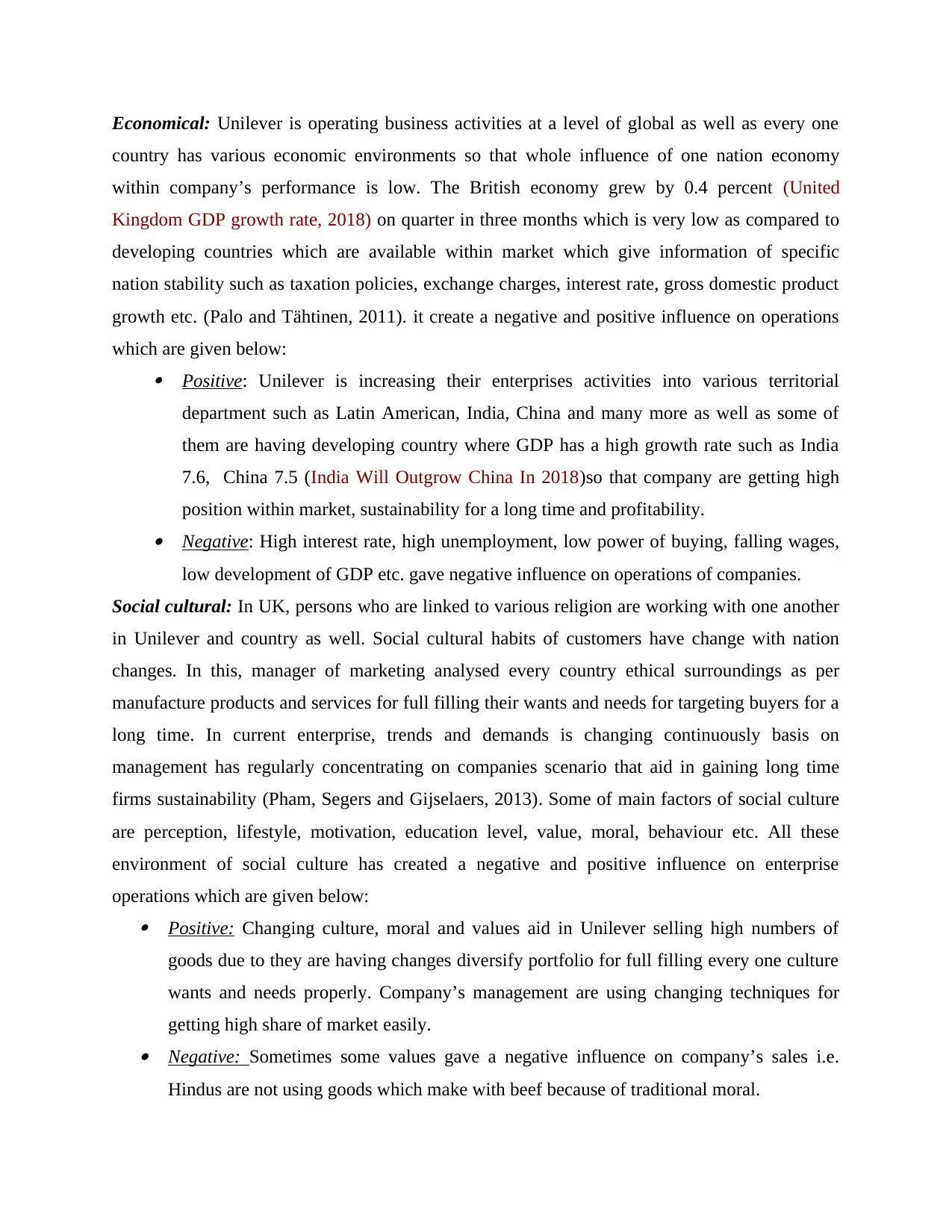
Economical: Unilever is operating business activities at a level of global as well as every one
country has various economic environments so that whole influence of one nation economy
within company’s performance is low. The British economy grew by 0.4 percent (United
Kingdom GDP growth rate, 2018) on quarter in three months which is very low as compared to
developing countries which are available within market which give information of specific
nation stability such as taxation policies, exchange charges, interest rate, gross domestic product
growth etc. (Palo and Tähtinen, 2011). it create a negative and positive influence on operations
which are given below: Positive: Unilever is increasing their enterprises activities into various territorial
department such as Latin American, India, China and many more as well as some of
them are having developing country where GDP has a high growth rate such as India
7.6, China 7.5 (India Will Outgrow China In 2018)so that company are getting high
position within market, sustainability for a long time and profitability. Negative: High interest rate, high unemployment, low power of buying, falling wages,
low development of GDP etc. gave negative influence on operations of companies.
Social cultural: In UK, persons who are linked to various religion are working with one another
in Unilever and country as well. Social cultural habits of customers have change with nation
changes. In this, manager of marketing analysed every country ethical surroundings as per
manufacture products and services for full filling their wants and needs for targeting buyers for a
long time. In current enterprise, trends and demands is changing continuously basis on
management has regularly concentrating on companies scenario that aid in gaining long time
firms sustainability (Pham, Segers and Gijselaers, 2013). Some of main factors of social culture
are perception, lifestyle, motivation, education level, value, moral, behaviour etc. All these
environment of social culture has created a negative and positive influence on enterprise
operations which are given below: Positive: Changing culture, moral and values aid in Unilever selling high numbers of
goods due to they are having changes diversify portfolio for full filling every one culture
wants and needs properly. Company’s management are using changing techniques for
getting high share of market easily. Negative: Sometimes some values gave a negative influence on company’s sales i.e.
Hindus are not using goods which make with beef because of traditional moral.
country has various economic environments so that whole influence of one nation economy
within company’s performance is low. The British economy grew by 0.4 percent (United
Kingdom GDP growth rate, 2018) on quarter in three months which is very low as compared to
developing countries which are available within market which give information of specific
nation stability such as taxation policies, exchange charges, interest rate, gross domestic product
growth etc. (Palo and Tähtinen, 2011). it create a negative and positive influence on operations
which are given below: Positive: Unilever is increasing their enterprises activities into various territorial
department such as Latin American, India, China and many more as well as some of
them are having developing country where GDP has a high growth rate such as India
7.6, China 7.5 (India Will Outgrow China In 2018)so that company are getting high
position within market, sustainability for a long time and profitability. Negative: High interest rate, high unemployment, low power of buying, falling wages,
low development of GDP etc. gave negative influence on operations of companies.
Social cultural: In UK, persons who are linked to various religion are working with one another
in Unilever and country as well. Social cultural habits of customers have change with nation
changes. In this, manager of marketing analysed every country ethical surroundings as per
manufacture products and services for full filling their wants and needs for targeting buyers for a
long time. In current enterprise, trends and demands is changing continuously basis on
management has regularly concentrating on companies scenario that aid in gaining long time
firms sustainability (Pham, Segers and Gijselaers, 2013). Some of main factors of social culture
are perception, lifestyle, motivation, education level, value, moral, behaviour etc. All these
environment of social culture has created a negative and positive influence on enterprise
operations which are given below: Positive: Changing culture, moral and values aid in Unilever selling high numbers of
goods due to they are having changes diversify portfolio for full filling every one culture
wants and needs properly. Company’s management are using changing techniques for
getting high share of market easily. Negative: Sometimes some values gave a negative influence on company’s sales i.e.
Hindus are not using goods which make with beef because of traditional moral.
⊘ This is a preview!⊘
Do you want full access?
Subscribe today to unlock all pages.

Trusted by 1+ million students worldwide
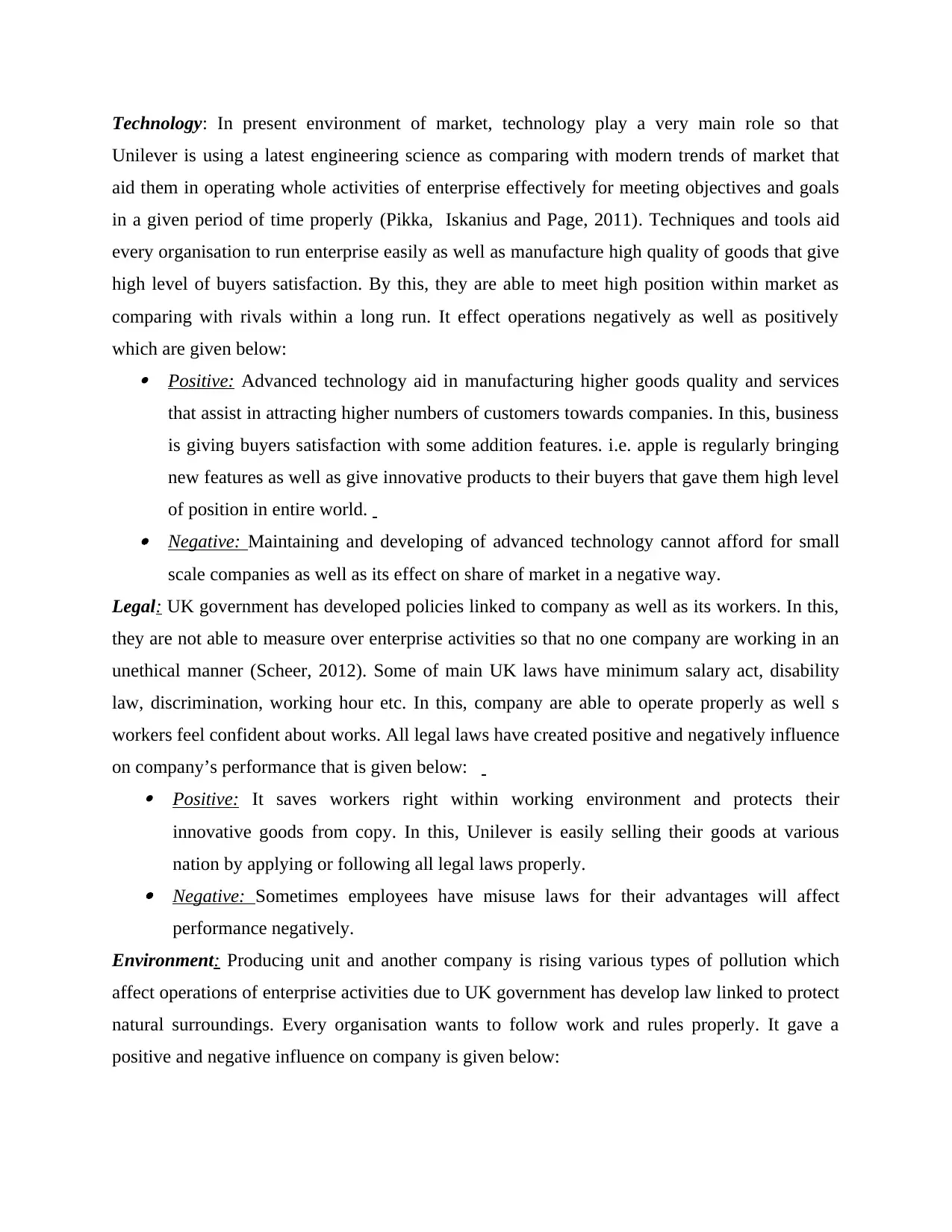
Technology: In present environment of market, technology play a very main role so that
Unilever is using a latest engineering science as comparing with modern trends of market that
aid them in operating whole activities of enterprise effectively for meeting objectives and goals
in a given period of time properly (Pikka, Iskanius and Page, 2011). Techniques and tools aid
every organisation to run enterprise easily as well as manufacture high quality of goods that give
high level of buyers satisfaction. By this, they are able to meet high position within market as
comparing with rivals within a long run. It effect operations negatively as well as positively
which are given below: Positive: Advanced technology aid in manufacturing higher goods quality and services
that assist in attracting higher numbers of customers towards companies. In this, business
is giving buyers satisfaction with some addition features. i.e. apple is regularly bringing
new features as well as give innovative products to their buyers that gave them high level
of position in entire world. Negative: Maintaining and developing of advanced technology cannot afford for small
scale companies as well as its effect on share of market in a negative way.
Legal: UK government has developed policies linked to company as well as its workers. In this,
they are not able to measure over enterprise activities so that no one company are working in an
unethical manner (Scheer, 2012). Some of main UK laws have minimum salary act, disability
law, discrimination, working hour etc. In this, company are able to operate properly as well s
workers feel confident about works. All legal laws have created positive and negatively influence
on company’s performance that is given below: Positive: It saves workers right within working environment and protects their
innovative goods from copy. In this, Unilever is easily selling their goods at various
nation by applying or following all legal laws properly. Negative: Sometimes employees have misuse laws for their advantages will affect
performance negatively.
Environment: Producing unit and another company is rising various types of pollution which
affect operations of enterprise activities due to UK government has develop law linked to protect
natural surroundings. Every organisation wants to follow work and rules properly. It gave a
positive and negative influence on company is given below:
Unilever is using a latest engineering science as comparing with modern trends of market that
aid them in operating whole activities of enterprise effectively for meeting objectives and goals
in a given period of time properly (Pikka, Iskanius and Page, 2011). Techniques and tools aid
every organisation to run enterprise easily as well as manufacture high quality of goods that give
high level of buyers satisfaction. By this, they are able to meet high position within market as
comparing with rivals within a long run. It effect operations negatively as well as positively
which are given below: Positive: Advanced technology aid in manufacturing higher goods quality and services
that assist in attracting higher numbers of customers towards companies. In this, business
is giving buyers satisfaction with some addition features. i.e. apple is regularly bringing
new features as well as give innovative products to their buyers that gave them high level
of position in entire world. Negative: Maintaining and developing of advanced technology cannot afford for small
scale companies as well as its effect on share of market in a negative way.
Legal: UK government has developed policies linked to company as well as its workers. In this,
they are not able to measure over enterprise activities so that no one company are working in an
unethical manner (Scheer, 2012). Some of main UK laws have minimum salary act, disability
law, discrimination, working hour etc. In this, company are able to operate properly as well s
workers feel confident about works. All legal laws have created positive and negatively influence
on company’s performance that is given below: Positive: It saves workers right within working environment and protects their
innovative goods from copy. In this, Unilever is easily selling their goods at various
nation by applying or following all legal laws properly. Negative: Sometimes employees have misuse laws for their advantages will affect
performance negatively.
Environment: Producing unit and another company is rising various types of pollution which
affect operations of enterprise activities due to UK government has develop law linked to protect
natural surroundings. Every organisation wants to follow work and rules properly. It gave a
positive and negative influence on company is given below:
Paraphrase This Document
Need a fresh take? Get an instant paraphrase of this document with our AI Paraphraser
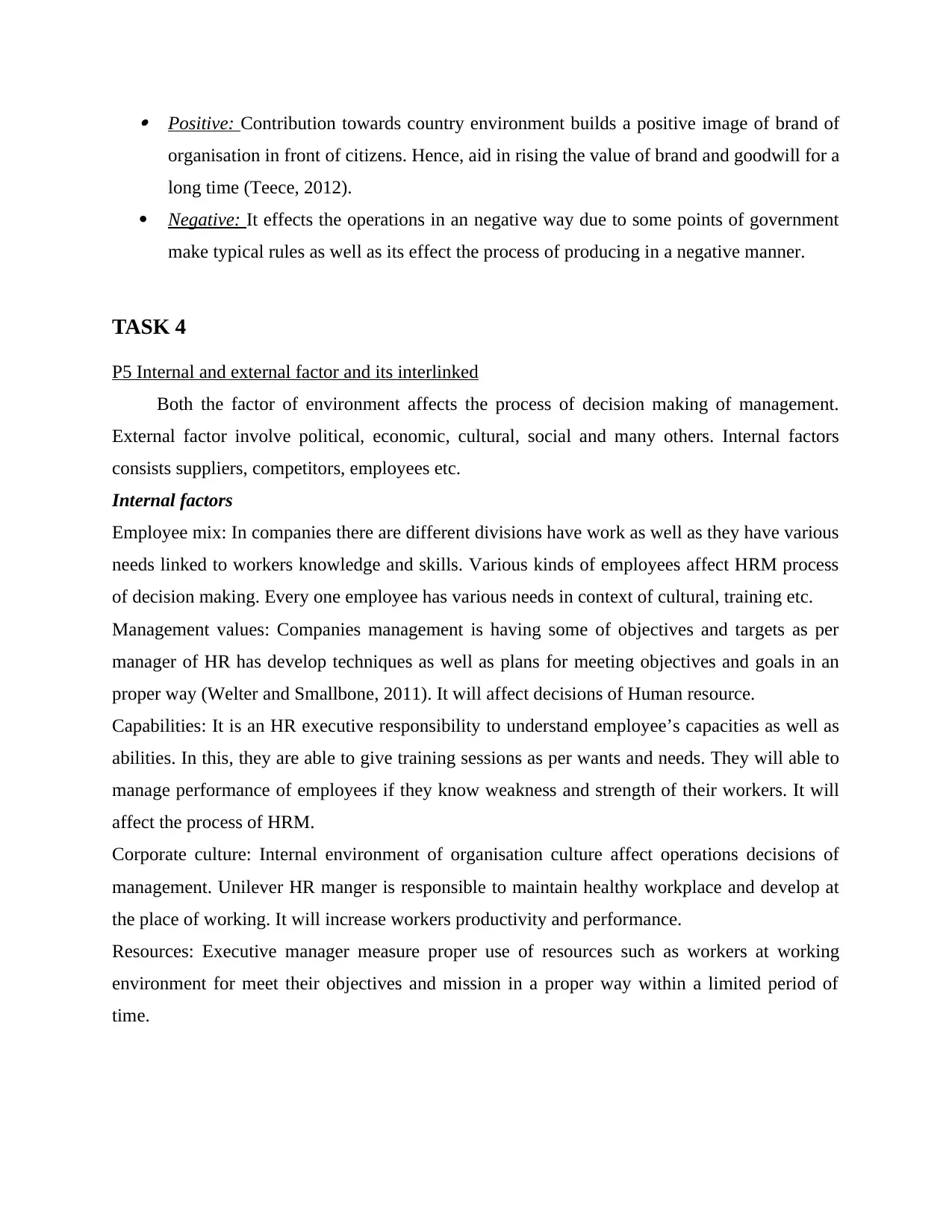
Positive: Contribution towards country environment builds a positive image of brand of
organisation in front of citizens. Hence, aid in rising the value of brand and goodwill for a
long time (Teece, 2012).
Negative: It effects the operations in an negative way due to some points of government
make typical rules as well as its effect the process of producing in a negative manner.
TASK 4
P5 Internal and external factor and its interlinked
Both the factor of environment affects the process of decision making of management.
External factor involve political, economic, cultural, social and many others. Internal factors
consists suppliers, competitors, employees etc.
Internal factors
Employee mix: In companies there are different divisions have work as well as they have various
needs linked to workers knowledge and skills. Various kinds of employees affect HRM process
of decision making. Every one employee has various needs in context of cultural, training etc.
Management values: Companies management is having some of objectives and targets as per
manager of HR has develop techniques as well as plans for meeting objectives and goals in an
proper way (Welter and Smallbone, 2011). It will affect decisions of Human resource.
Capabilities: It is an HR executive responsibility to understand employee’s capacities as well as
abilities. In this, they are able to give training sessions as per wants and needs. They will able to
manage performance of employees if they know weakness and strength of their workers. It will
affect the process of HRM.
Corporate culture: Internal environment of organisation culture affect operations decisions of
management. Unilever HR manger is responsible to maintain healthy workplace and develop at
the place of working. It will increase workers productivity and performance.
Resources: Executive manager measure proper use of resources such as workers at working
environment for meet their objectives and mission in a proper way within a limited period of
time.
organisation in front of citizens. Hence, aid in rising the value of brand and goodwill for a
long time (Teece, 2012).
Negative: It effects the operations in an negative way due to some points of government
make typical rules as well as its effect the process of producing in a negative manner.
TASK 4
P5 Internal and external factor and its interlinked
Both the factor of environment affects the process of decision making of management.
External factor involve political, economic, cultural, social and many others. Internal factors
consists suppliers, competitors, employees etc.
Internal factors
Employee mix: In companies there are different divisions have work as well as they have various
needs linked to workers knowledge and skills. Various kinds of employees affect HRM process
of decision making. Every one employee has various needs in context of cultural, training etc.
Management values: Companies management is having some of objectives and targets as per
manager of HR has develop techniques as well as plans for meeting objectives and goals in an
proper way (Welter and Smallbone, 2011). It will affect decisions of Human resource.
Capabilities: It is an HR executive responsibility to understand employee’s capacities as well as
abilities. In this, they are able to give training sessions as per wants and needs. They will able to
manage performance of employees if they know weakness and strength of their workers. It will
affect the process of HRM.
Corporate culture: Internal environment of organisation culture affect operations decisions of
management. Unilever HR manger is responsible to maintain healthy workplace and develop at
the place of working. It will increase workers productivity and performance.
Resources: Executive manager measure proper use of resources such as workers at working
environment for meet their objectives and mission in a proper way within a limited period of
time.
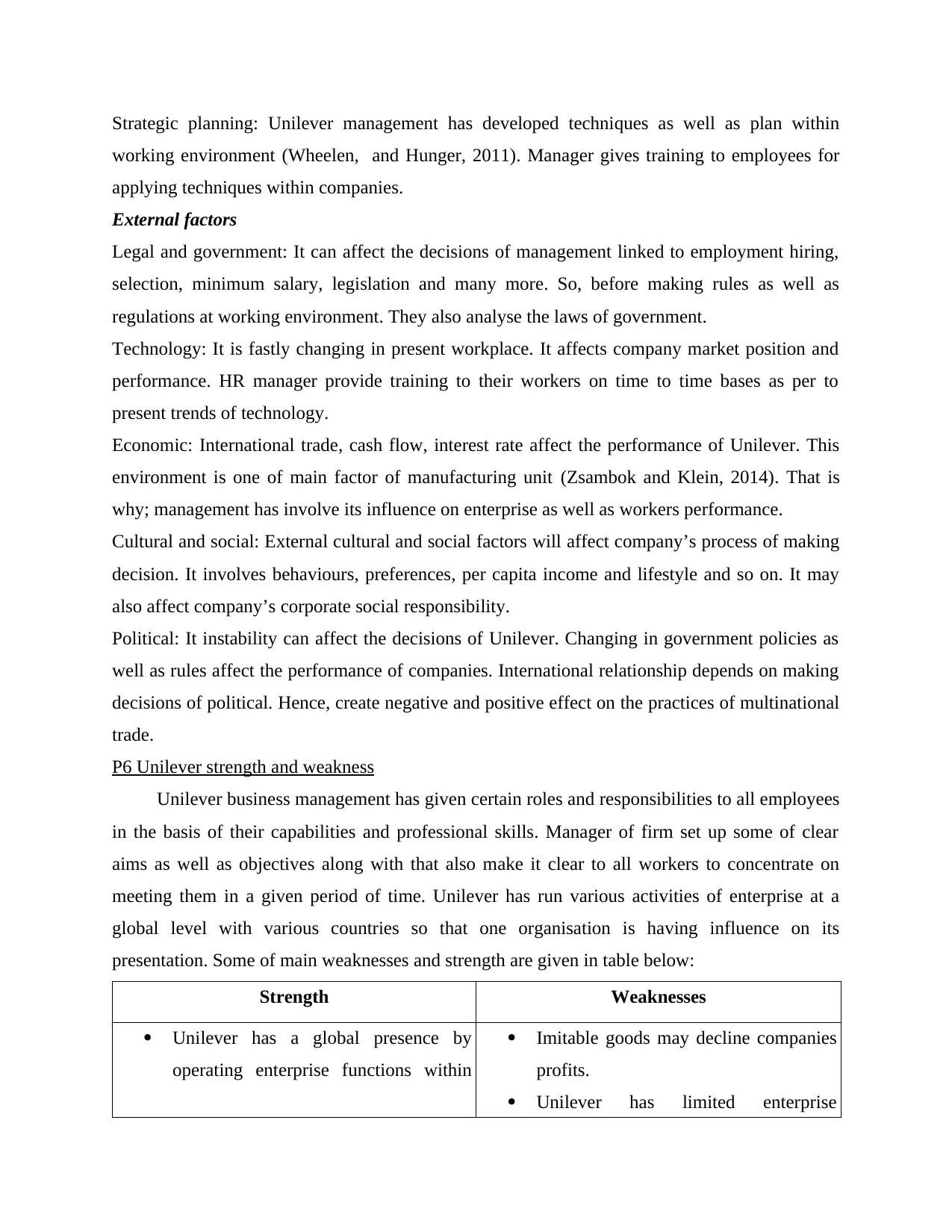
Strategic planning: Unilever management has developed techniques as well as plan within
working environment (Wheelen, and Hunger, 2011). Manager gives training to employees for
applying techniques within companies.
External factors
Legal and government: It can affect the decisions of management linked to employment hiring,
selection, minimum salary, legislation and many more. So, before making rules as well as
regulations at working environment. They also analyse the laws of government.
Technology: It is fastly changing in present workplace. It affects company market position and
performance. HR manager provide training to their workers on time to time bases as per to
present trends of technology.
Economic: International trade, cash flow, interest rate affect the performance of Unilever. This
environment is one of main factor of manufacturing unit (Zsambok and Klein, 2014). That is
why; management has involve its influence on enterprise as well as workers performance.
Cultural and social: External cultural and social factors will affect company’s process of making
decision. It involves behaviours, preferences, per capita income and lifestyle and so on. It may
also affect company’s corporate social responsibility.
Political: It instability can affect the decisions of Unilever. Changing in government policies as
well as rules affect the performance of companies. International relationship depends on making
decisions of political. Hence, create negative and positive effect on the practices of multinational
trade.
P6 Unilever strength and weakness
Unilever business management has given certain roles and responsibilities to all employees
in the basis of their capabilities and professional skills. Manager of firm set up some of clear
aims as well as objectives along with that also make it clear to all workers to concentrate on
meeting them in a given period of time. Unilever has run various activities of enterprise at a
global level with various countries so that one organisation is having influence on its
presentation. Some of main weaknesses and strength are given in table below:
Strength Weaknesses
Unilever has a global presence by
operating enterprise functions within
Imitable goods may decline companies
profits.
Unilever has limited enterprise
working environment (Wheelen, and Hunger, 2011). Manager gives training to employees for
applying techniques within companies.
External factors
Legal and government: It can affect the decisions of management linked to employment hiring,
selection, minimum salary, legislation and many more. So, before making rules as well as
regulations at working environment. They also analyse the laws of government.
Technology: It is fastly changing in present workplace. It affects company market position and
performance. HR manager provide training to their workers on time to time bases as per to
present trends of technology.
Economic: International trade, cash flow, interest rate affect the performance of Unilever. This
environment is one of main factor of manufacturing unit (Zsambok and Klein, 2014). That is
why; management has involve its influence on enterprise as well as workers performance.
Cultural and social: External cultural and social factors will affect company’s process of making
decision. It involves behaviours, preferences, per capita income and lifestyle and so on. It may
also affect company’s corporate social responsibility.
Political: It instability can affect the decisions of Unilever. Changing in government policies as
well as rules affect the performance of companies. International relationship depends on making
decisions of political. Hence, create negative and positive effect on the practices of multinational
trade.
P6 Unilever strength and weakness
Unilever business management has given certain roles and responsibilities to all employees
in the basis of their capabilities and professional skills. Manager of firm set up some of clear
aims as well as objectives along with that also make it clear to all workers to concentrate on
meeting them in a given period of time. Unilever has run various activities of enterprise at a
global level with various countries so that one organisation is having influence on its
presentation. Some of main weaknesses and strength are given in table below:
Strength Weaknesses
Unilever has a global presence by
operating enterprise functions within
Imitable goods may decline companies
profits.
Unilever has limited enterprise
⊘ This is a preview!⊘
Do you want full access?
Subscribe today to unlock all pages.

Trusted by 1+ million students worldwide
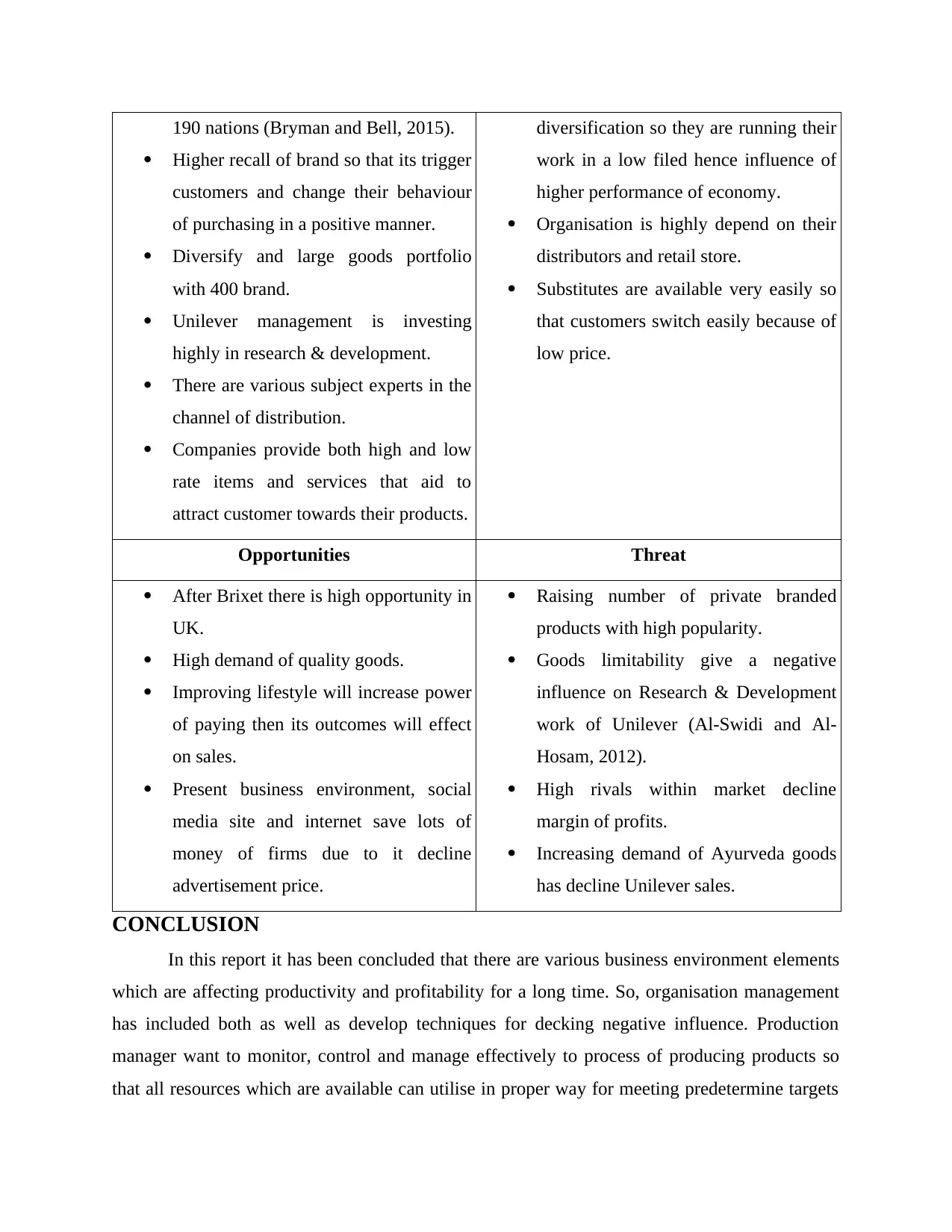
190 nations (Bryman and Bell, 2015).
Higher recall of brand so that its trigger
customers and change their behaviour
of purchasing in a positive manner.
Diversify and large goods portfolio
with 400 brand.
Unilever management is investing
highly in research & development.
There are various subject experts in the
channel of distribution.
Companies provide both high and low
rate items and services that aid to
attract customer towards their products.
diversification so they are running their
work in a low filed hence influence of
higher performance of economy.
Organisation is highly depend on their
distributors and retail store.
Substitutes are available very easily so
that customers switch easily because of
low price.
Opportunities Threat
After Brixet there is high opportunity in
UK.
High demand of quality goods.
Improving lifestyle will increase power
of paying then its outcomes will effect
on sales.
Present business environment, social
media site and internet save lots of
money of firms due to it decline
advertisement price.
Raising number of private branded
products with high popularity.
Goods limitability give a negative
influence on Research & Development
work of Unilever (Al-Swidi and Al-
Hosam, 2012).
High rivals within market decline
margin of profits.
Increasing demand of Ayurveda goods
has decline Unilever sales.
CONCLUSION
In this report it has been concluded that there are various business environment elements
which are affecting productivity and profitability for a long time. So, organisation management
has included both as well as develop techniques for decking negative influence. Production
manager want to monitor, control and manage effectively to process of producing products so
that all resources which are available can utilise in proper way for meeting predetermine targets
Higher recall of brand so that its trigger
customers and change their behaviour
of purchasing in a positive manner.
Diversify and large goods portfolio
with 400 brand.
Unilever management is investing
highly in research & development.
There are various subject experts in the
channel of distribution.
Companies provide both high and low
rate items and services that aid to
attract customer towards their products.
diversification so they are running their
work in a low filed hence influence of
higher performance of economy.
Organisation is highly depend on their
distributors and retail store.
Substitutes are available very easily so
that customers switch easily because of
low price.
Opportunities Threat
After Brixet there is high opportunity in
UK.
High demand of quality goods.
Improving lifestyle will increase power
of paying then its outcomes will effect
on sales.
Present business environment, social
media site and internet save lots of
money of firms due to it decline
advertisement price.
Raising number of private branded
products with high popularity.
Goods limitability give a negative
influence on Research & Development
work of Unilever (Al-Swidi and Al-
Hosam, 2012).
High rivals within market decline
margin of profits.
Increasing demand of Ayurveda goods
has decline Unilever sales.
CONCLUSION
In this report it has been concluded that there are various business environment elements
which are affecting productivity and profitability for a long time. So, organisation management
has included both as well as develop techniques for decking negative influence. Production
manager want to monitor, control and manage effectively to process of producing products so
that all resources which are available can utilise in proper way for meeting predetermine targets
Paraphrase This Document
Need a fresh take? Get an instant paraphrase of this document with our AI Paraphraser
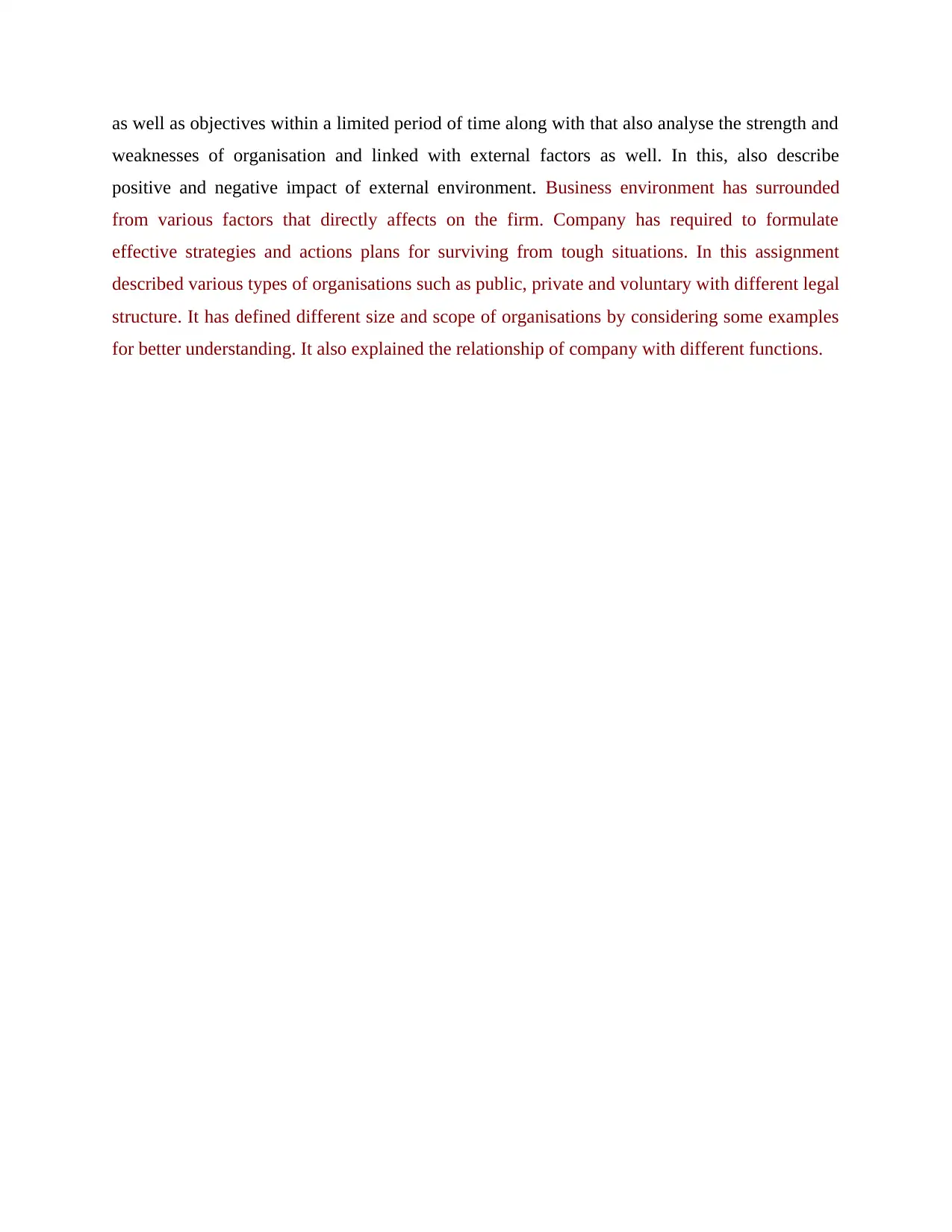
as well as objectives within a limited period of time along with that also analyse the strength and
weaknesses of organisation and linked with external factors as well. In this, also describe
positive and negative impact of external environment. Business environment has surrounded
from various factors that directly affects on the firm. Company has required to formulate
effective strategies and actions plans for surviving from tough situations. In this assignment
described various types of organisations such as public, private and voluntary with different legal
structure. It has defined different size and scope of organisations by considering some examples
for better understanding. It also explained the relationship of company with different functions.
weaknesses of organisation and linked with external factors as well. In this, also describe
positive and negative impact of external environment. Business environment has surrounded
from various factors that directly affects on the firm. Company has required to formulate
effective strategies and actions plans for surviving from tough situations. In this assignment
described various types of organisations such as public, private and voluntary with different legal
structure. It has defined different size and scope of organisations by considering some examples
for better understanding. It also explained the relationship of company with different functions.
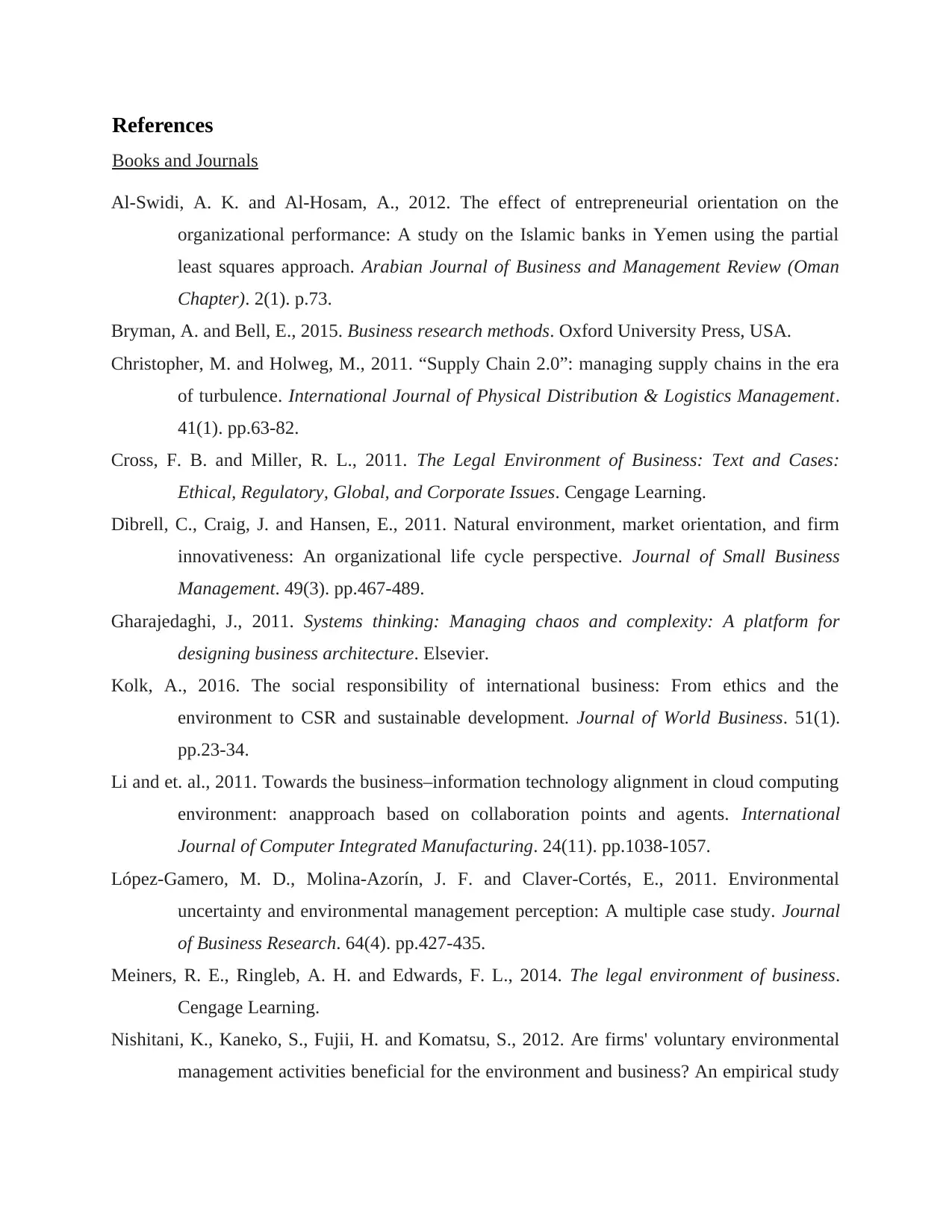
References
Books and Journals
Al-Swidi, A. K. and Al-Hosam, A., 2012. The effect of entrepreneurial orientation on the
organizational performance: A study on the Islamic banks in Yemen using the partial
least squares approach. Arabian Journal of Business and Management Review (Oman
Chapter). 2(1). p.73.
Bryman, A. and Bell, E., 2015. Business research methods. Oxford University Press, USA.
Christopher, M. and Holweg, M., 2011. “Supply Chain 2.0”: managing supply chains in the era
of turbulence. International Journal of Physical Distribution & Logistics Management.
41(1). pp.63-82.
Cross, F. B. and Miller, R. L., 2011. The Legal Environment of Business: Text and Cases:
Ethical, Regulatory, Global, and Corporate Issues. Cengage Learning.
Dibrell, C., Craig, J. and Hansen, E., 2011. Natural environment, market orientation, and firm
innovativeness: An organizational life cycle perspective. Journal of Small Business
Management. 49(3). pp.467-489.
Gharajedaghi, J., 2011. Systems thinking: Managing chaos and complexity: A platform for
designing business architecture. Elsevier.
Kolk, A., 2016. The social responsibility of international business: From ethics and the
environment to CSR and sustainable development. Journal of World Business. 51(1).
pp.23-34.
Li and et. al., 2011. Towards the business–information technology alignment in cloud computing
environment: anapproach based on collaboration points and agents. International
Journal of Computer Integrated Manufacturing. 24(11). pp.1038-1057.
López-Gamero, M. D., Molina-Azorín, J. F. and Claver-Cortés, E., 2011. Environmental
uncertainty and environmental management perception: A multiple case study. Journal
of Business Research. 64(4). pp.427-435.
Meiners, R. E., Ringleb, A. H. and Edwards, F. L., 2014. The legal environment of business.
Cengage Learning.
Nishitani, K., Kaneko, S., Fujii, H. and Komatsu, S., 2012. Are firms' voluntary environmental
management activities beneficial for the environment and business? An empirical study
Books and Journals
Al-Swidi, A. K. and Al-Hosam, A., 2012. The effect of entrepreneurial orientation on the
organizational performance: A study on the Islamic banks in Yemen using the partial
least squares approach. Arabian Journal of Business and Management Review (Oman
Chapter). 2(1). p.73.
Bryman, A. and Bell, E., 2015. Business research methods. Oxford University Press, USA.
Christopher, M. and Holweg, M., 2011. “Supply Chain 2.0”: managing supply chains in the era
of turbulence. International Journal of Physical Distribution & Logistics Management.
41(1). pp.63-82.
Cross, F. B. and Miller, R. L., 2011. The Legal Environment of Business: Text and Cases:
Ethical, Regulatory, Global, and Corporate Issues. Cengage Learning.
Dibrell, C., Craig, J. and Hansen, E., 2011. Natural environment, market orientation, and firm
innovativeness: An organizational life cycle perspective. Journal of Small Business
Management. 49(3). pp.467-489.
Gharajedaghi, J., 2011. Systems thinking: Managing chaos and complexity: A platform for
designing business architecture. Elsevier.
Kolk, A., 2016. The social responsibility of international business: From ethics and the
environment to CSR and sustainable development. Journal of World Business. 51(1).
pp.23-34.
Li and et. al., 2011. Towards the business–information technology alignment in cloud computing
environment: anapproach based on collaboration points and agents. International
Journal of Computer Integrated Manufacturing. 24(11). pp.1038-1057.
López-Gamero, M. D., Molina-Azorín, J. F. and Claver-Cortés, E., 2011. Environmental
uncertainty and environmental management perception: A multiple case study. Journal
of Business Research. 64(4). pp.427-435.
Meiners, R. E., Ringleb, A. H. and Edwards, F. L., 2014. The legal environment of business.
Cengage Learning.
Nishitani, K., Kaneko, S., Fujii, H. and Komatsu, S., 2012. Are firms' voluntary environmental
management activities beneficial for the environment and business? An empirical study
⊘ This is a preview!⊘
Do you want full access?
Subscribe today to unlock all pages.

Trusted by 1+ million students worldwide
1 out of 14
Related Documents
Your All-in-One AI-Powered Toolkit for Academic Success.
+13062052269
info@desklib.com
Available 24*7 on WhatsApp / Email
![[object Object]](/_next/static/media/star-bottom.7253800d.svg)
Unlock your academic potential
Copyright © 2020–2026 A2Z Services. All Rights Reserved. Developed and managed by ZUCOL.





